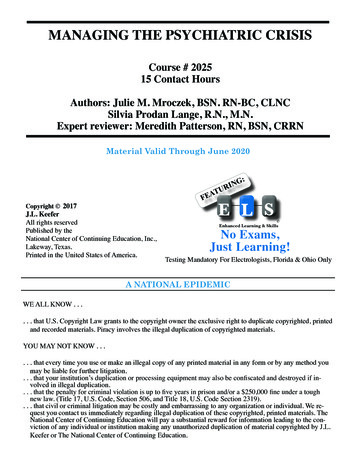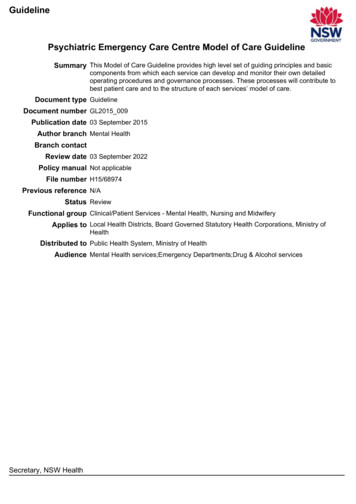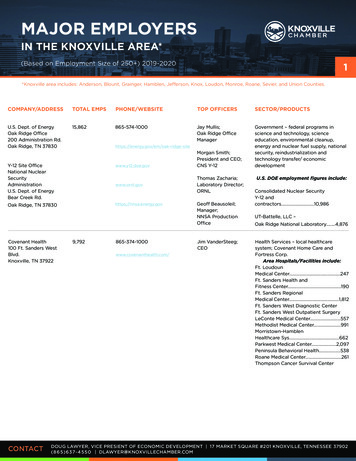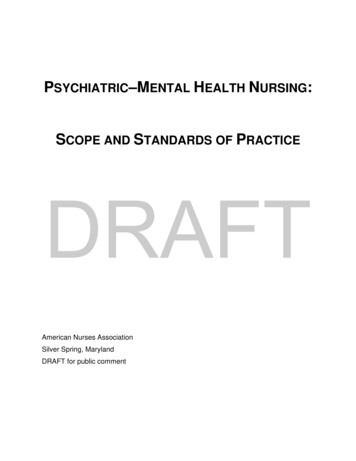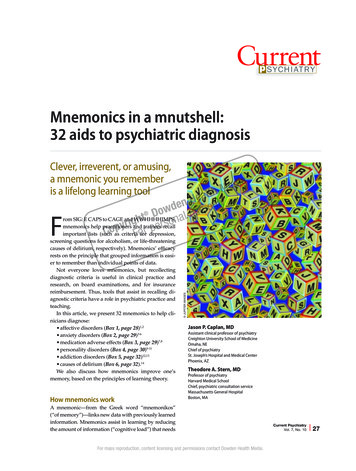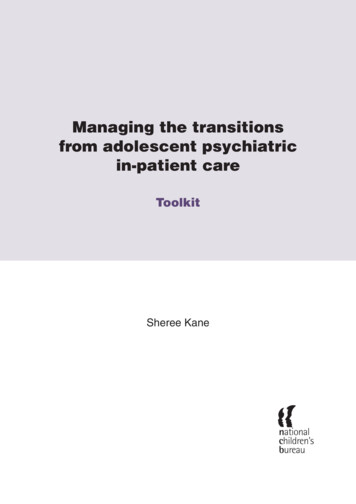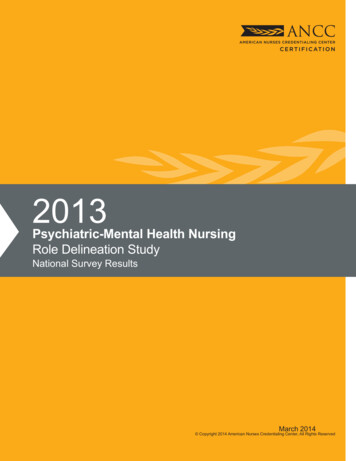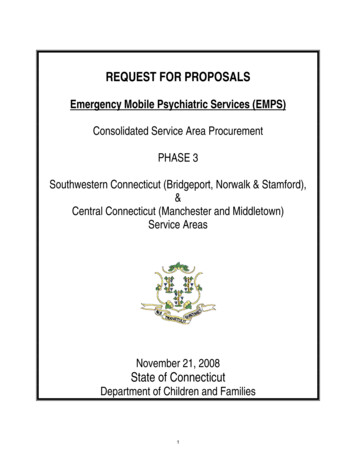
Transcription
REQUEST FOR PROPOSALSEmergency Mobile Psychiatric Services (EMPS)Consolidated Service Area ProcurementPHASE 3Southwestern Connecticut (Bridgeport, Norwalk & Stamford),&Central Connecticut (Manchester and Middletown)Service AreasNovember 21, 2008State of ConnecticutDepartment of Children and Families1
TABLE OF CONTENTSPROGRAM TITLE. 4PROCUREMENT SCHEDULE . 4OVERVIEW. 4SOURCE OF FUNDS . 5AMOUNT AND TERMS OF AWARD. 6PERIOD OF AWARD. 6DISPOSITION OF PROPOSALS. 6ELIGIBILITY. 6INSURANCE. 6APPLICATION DEADLINE . 7TECHNICAL ASSISTANCE / BIDDERS CONFERENCE. 7LETTER OF INTENT . 7RFP CONTACT PERSON . 7QUESTIONS. 8PURPOSE AND GOALS . 8TARGET POPULATION . 8MODEL DESCRIPTION. 9MULTICULTURAL AND LINGUISTICALLY COMPETENT TRAINING AND CARE . 13APPLICANT QUALIFICATIONS. 13APPLICATION INSTRUCTIONS AND REVIEW INFORMATION . 13APPLICATION FORMAT. 14APPENDICES. 14REVIEW CONTEXT. 15REVIEW PROCEDURES . 15PREPARING A RESPONSIVE APPLICATION . 17APPLICATION QUESTIONS. 182
BUDGET FORMS . . 20LETTER OF INTENT . 24COVER SHEET . 25SUBCONTRACTOR PROFILE. 26GENERAL PROPOSAL NOTICES AND REQUIREMENTS . 27CONSULTING AGREEMENT AFFIDAVIT . 30EXHIBIT A. 313
State of ConnecticutDepartment of Children and Families505 Hudson StreetHartford, CT 06106REQUEST FOR PROPOSALS (RFP)PROGRAM TITLEEmergency Mobile Psychiatric Service for Western Connecticut and for New Haven Service AreasPROCUREMENT SCHEDULEThe following table summarizes activities and associated dates for this procurement. These activities and dates aredetailed in the relevant RFP sections below:RFP Planning and DevelopmentRFP PublishedNon-MandatoryTA/Bidders ConferenceDeadline for Submission of QuestionsDeadline for Receipt of Required Letter of IntentQuestions and Answers Posted to WebsiteDeadline for Receipt of ProposalsAnticipated Date of Contract ExecutionInitiated Spring 2007November 21, 2008December 10, 2008 at 9:00 AM8th floor A/V conference roomDecember 17, 2008 at 4:00 pmDecember 19, 2008 at 4:00 pmOn or About December 30, 2008February 3, 2009 at 3:00 PMMarch 2009OVERVIEWThe Connecticut Department of Children and Families is the primary funding entity for the Emergency MobilePsychiatric Service Program for children, youth and their families. In an effort to improve the quality, effectivenessand efficiency of the EMPS program the Department is rebidding the state-wide EMPS service network with thesegoals: to improve access to timely and appropriate care in the community; to decrease use of emergencydepartments and inpatient hospitalization and to increase awareness of the availability of emergency mobileresponse by particular groups.Through a series of procurements this fiscal year, the department will be purchasing the various components of theEMPS system. In order to maintain continuity of service for this essential component of the Behavioral HealthService System, the procurement will occur in phases of which this RFP represents Phase 3. The core componentsof the new EMPS system are described below: Six (6) Consolidated EMPS Service Areas: In order to provide maximum flexibility for contracted agenciesand to capitalize on improved efficiencies associated with larger service areas, the Department will beestablishing six (6) EMPS service areas that together, will provide coverage of the entire state. Boundaries ofthe new service areas will generally conform to a combination of several area offices. However, there are afew exceptions where individual towns may be excluded/included based on historical contracting and/orservice delivery patterns. The six EMPS Service Areas are listed in the table below.AreaArea OfficesTown/ExceptionsGreater HartfordService AreaHartford, NewBritain, & MeridenWindsor & Bloomfieldare carved OUT of thisservice area; Plymouth4Allocated Funding(Annualized)Phase/ProjectedDate of RFPRelease 2,294,808 Phase 1May 2008
Eastern ConnecticutService AreaWestern ServiceAreaNorwich &WillimanticWaterbury, Danbury,& TorringtonNew Haven ServiceAreaGreater & MetroNew HavenSouthwesternService AreaCentral ServiceAreaBridgeport, Norwalk& StamfordManchester &MiddletownStatewideAll& Terryville are carvedIN to this service areaNonePlymouth & Terryvilleare carved OUT of thisservice area.Guilford & Madisonare carved IN to thisservice areaNoneGuilford & Madisonare carved OUT of thisservice area; Windsor& Bloomfield arecarved IN to this serviceareaN/A 1,121,305 Phase 1May 2008 1,633,439 Phase 2August 2008 1,646,270 Phase 2August 2008 1,657,641 Phase 3November 2008 973,285 Phase 3November 2008 9,326,748 TransitionCompleted byJune 2009 Centralized Call Center: A statewide call center is a key component of the redesigned EMPS System. Thecall center will help to a) improve the consistency of call definition and the protocol for responding toemergency calls, b) improve ease of access by consumers, c) aid in statewide marketing efforts due to theavailability of a single access number, d) improve provider accountability via call center capacity forindependent standardized data collection, and e) achieve improved system efficiency by consolidatingmultiple redundant call center locations. Each of the national exemplary emergency mobile psychiatricprograms reviewed by a DCF contracted independent consultant utilized a centralized call center. The callcenter will also have the responsibility for the development of marketing strategies and the production ofmarketing materials (customizable brochures, magnets, stickers, posters, etc.). The call center is now undercontract with United Way/211 as the service provider. Quality Improvement and Training: The professional literature (Fixen, 2006) and the state's experiencewith the implementation of evidence based practices has highlighted the value of strong quality improvementprocesses and standardized training to the delivery of quality mental health services. The QualityImprovement and Training vendor will be responsible for the collection, analysis, and reporting of qualityimprovement data collected by the call center and EMPS providers. They will also be responsible for externalmonitoring of quality through a combination of consultation, satisfaction surveys, and fidelity ratings. Thetraining and workforce development responsibilities will include the provision of in-service and pre-servicetraining in the core competencies necessary to operate a quality mobile psychiatric service. Due to limitedresources and the need to fund program overlap during the transition from the old to the new EMPS system,the implementation of the Quality Improvement and Training component will be delayed until sometime in thelatter half of FY 09 or the beginning of the 2010 fiscal year. In the interim the department will work withinavailable resources to provide/facilitate as much of the core curriculum to EMPS contractors as possible. Contract Implications: The procurement of the new EMPS Program will require making adjustments toexisting contracts for EMPS, Care Coordination, and Enhanced Care Coordination that have historically beenbundled into a single multi-service contract. The department will be "unbundling these contracts" and hasbeen engaged in an analysis to establish separate cost centers, dollar amounts and scopes of service for5
each program (e.g. EMPS, Care Coordination, and Enhanced Care Coordination). Existing EMPS providersfor service areas that fall within those being re-procured in PHASE 3 of the new system implementation will benotified, in writing, of the end of their EMPS contract for service and the resulting reduction in funding. Newcontracts will be established for Care Coordination and Enhanced Care Coordination to reflect the"unbundling" of these services. Neither Care Coordination nor Enhanced Care Coordination is being reprocured at this time.SOURCE OF FUNDSThe EMPS Teams will be funded by state dollars to be awarded through the Department based upon a competitiveprocurement process. Any and all awards will be contingent upon the continued availability of state funds.AMOUNT AND TERMS OF AWARDSouthwestern Connecticut: A total of 1,657,641 (one million, six hundred fifty seven thousand, six hundred andforty one) dollars will be available to fund the Southwestern Connecticut EMPS Service Area on an annualized basis.Startup expenses will be available up to 2 months prior to full program operation and will be negotiated with theselected contractor.Central: A total of 973,285 (nine hundred and seventy three thousand, two hundred and eighty five) dollars will beavailable to fund the Central EMPS Service Area (including Middletown and Manchester) on an annualized basis.Startup expenses will be available up to 2 months prior to full program operation and will be negotiated with theselected contractor.PERIOD OF AWARDThe selected contractor may enter into a contract for a period of up to three (3) years beginning on or about March 1,2008. Ongoing funding will be contingent upon the performance of the awarded contractor and the continuedavailability of state funds.DISPOSITION OF PROPOSALSThe Department reserves the right to reject any and all proposals, or portions thereof, received as a result of thisrequest, or to negotiate separately any service in any manner necessary to serve the best interests of theDepartment. The Department reserves the right to contract for all or any portion of the scope of work containedwithin this RFP if it is determined that contracting for a portion or all of the work will best meet the needs of theDepartment.CERTIFICATE OF NEED (CON) REQUIREMENTSSuccessful applicants entering into a contract for EMPS may be required to obtain a CON or exemption from theCON process from the Office of Health Care Access (OHCA) if the implementation of the EMPS represents anexpansion, relocation, transfer of ownership or other potentially substantive change in access or availability of theservice or program. Upon notification of the right to negotiate a contract with DCF, successful applicants shouldcontact OHCA or DCF (Bert Plant, Ph.D. - Robert.plant@ct.gov) to determine if a CON or Exemption is required intheir particular case.ELIGIBILITYThe successful applicant will be an organization in good standing with the State of Connecticut. This shall mean thatthe Applicant and proposed subcontractors are not currently and have not been subject to DCF or other state agencylicensing restriction, nor may the Applicant have had a program terminated within the last three (3) years due toquality of care or other agency performance issues. A current investigation of Medicaid fraud or a judgment involvingMedicaid fraud within the past five (5) years also excludes a provider from participation. Proposals from applicantswho appear on the United States General Services Administration Excluded Parties List will not be considered.6
The applicant must be authorized or eligible for reimbursement under the Medicaid Program and an approvedprovider within the Connecticut Behavioral Health Partnership.INSURANCEThe Respondent will carry insurance (liability, fidelity bonding or surety bonding and/or other), during the term of thiscontract according to the nature of the work to be performed to “save harmless” the State of Connecticut from anyclaims, suits or demands that may be asserted against it by reason of any act or omission of the Respondent, subRespondent or employees in providing services hereunder, including but not limited to any claims or demands formalpractice. Certificates of such insurance shall be filed with the Department prior to the performance of services.APPLICATION DEADLINEThe contact person (see below) must receive one (1) original and ten (10) copies of each Respondent’sapplication(s) no later than 3 p.m. on February 3, 2009 at the following DCF location (see also “ApplicationInstructions” section):Judith JordanDirector of Grants Development and Contract ManagementDepartment of Children and Families505 Hudson StreetHartford, CT 06106Each copy must be complete, collated, and ready for reviewers. Please note that faxed and electronic versions ofthe application will not be accepted. Also, no applications will be accepted or considered for review after the duedate and the time stated above.TECHNICAL ASSISTANCE / BIDDERS CONFERENCEA non-mandatory Technical Assistance / Bidders Conference is scheduled for 9:00 a.m. on December 10th, 2008at the following location:DCF Central Office8th Floor AV Conference Room505 Hudson StreetHartford, CT 06106Although attendance at the Technical Assistance meeting is not mandatory, please RSVP for the TechnicalAssistance meeting by calling, faxing, or e-mailing the contact person below. NOTE: Copies of the RFP will not beavailable at the Technical Assistance (TA) meeting. Respondents are asked to bring a copy of the RFP with them tothe TA for reference.LETTER OF INTENTA non-binding Letter of Intent is required. No application for funding will be accepted from any Respondent who hasfailed to submit a Letter of Intent within the specified time frame. Letters of Intent should be directed to and receivedby the person noted on the Letter of Intent form by December 19th, 2008 at 4:00 PM. Faxed or e-mailed copiesof the Letter of Intent will be accepted. Please notify the DCF contact person noted on the Letter of Intent formif, within 24 hours of your having e-mailed or faxed your Letter of Intent to DCF, you do not receive aconfirmation of its receipt.RFP CONTACT PERSONThe Contact Person for this RFP is as follows:Tim Marshall7
Department of Children and FamiliesBureau of Behavioral Health and Medicine505 Hudson StreetHartford, CT 06106Phone: 860-550-6531 Fax: 860-566-8022Email: tim.marshall@ct.govQUESTIONSQuestions concerning this RFP will be answered at the above-mentioned Technical Assistance Meeting/Bidders’Conference. Answers to questions about this RFP will be responded to only at the Technical Assistance meetingand through the prescribed electronic “Questions and Answer” method and period. Subsequent questions regardingthe RFP and its content must be received via email by December 17, 2008 at 4:00 PM and directed to TimMarshall (tim.marshall@ct.gov). The Department will post responses to these questions on The Department ofAdministrative Services (DAS) website http://www.das.state.ct.us/Purchase/Portal/Portal Home.asp on or aboutDecember 30, 2008.PURPOSE AND GOALSThe purpose of EMPS is to provide community based rapid emergency crisis stabilization to children and families andto provide brief follow-up care to promote continued stabilization and linkage with ongoing supports and serviceswithin the community. Effective crisis intervention reduces the need for emergency department visits, policeinvolvement and arrest, psychiatric hospitalization, and continued or repeated crisis intervention. In this effort toimprove upon the existing EMPS system, the department has established the following goals;1. increase mobile response to community crisis (including expanded hours of mobility)2. increase the total number of calls managed by the EMPS system3. expand/enhance EMPS utilization by key groups (foster parents, schools, police, others)4. improve the relationship between EMPS and EDs5. reduce psychiatric visits to Emergency Departments (EDs)6. increase the rate of ED diversion from inpatient admission to community care7. improve the public perception/confidence/awareness of EMPS8. improve the linkage between the EMPS provider network and the rest of the community9. ensure a competent crisis assessment and linkage service10. improve the efficiency/cost effectiveness of the EMPS systemTARGET POPULATIONThe target population for EMPS is quite simply any child or youth in the community who is in the midst of apsychiatric, behavioral, or emotional crisis for which an immediate/emergent response is required. The targetpopulation will include the following children and youth: Those who are uninsured Enrolled in Husky A or B Enrolled in DCF Voluntary Services Involved with DCF Child Protective Services Involved with DCF Juvenile Justice Services Receiving behavioral health services from a community provider Involved with the Court Support Services Division (CSSD) In a foster or adoptive home Presenting in psychiatric crisis in a hospital emergency department (ED) and in need of continued stabilizationand follow-up care upon discharge from the ED Experiencing a psychiatric, behavioral, or emotional crisis in a school, after school program or othercommunity setting8
Any other child or youth in the community experiencing a psychiatric, behavioral, or emotional crisisregardless of their insurance or citizenship statusThe priorities for EMPS intervention are children and youth who lack a current connection with a qualified mentalhealth provider and thereby have no, or limited access to crisis intervention supports or services. However, having acurrent connection with a qualified provider does not preclude or prohibit EMPS response. EMPS clinicians thatreceive inquiries for crisis intervention from clients with an existing connection to a qualified provider should respondto the crisis as the situation requires, involving the existing provider to the extent possible but proceeding withintervention regardless of the immediate availability of the provider. In those situations where an individual provider,group, or clinic is persistently unavailable to respond to crisis situations involving their clients, the EMPS provider andDCF will intervene with the identified provider and will negotiate alternative plans to more appropriately respond tochildren and families and insure the appropriate use of EMPS resources.Children residing in a psychiatric inpatient unit, sub-acute unit or Psychiatric Residential Treatment Facility (PRTF),or a residential treatment center are not eligible for EMPS intervention.MODEL DESCRIPTIONScope of WorkThe responsibility of the selected EMPS contractor is the provision of the EMPS to all towns located within theirservice area. This area includes all the towns associated with the area offices included in this RFP, unless otherwise specified on page 4-5. The contractor must provide all staffing, office space, equipment, materials, supports,and resources necessary to meet the performance requirements of the EMPS either directly or through sub-contractarrangements. The selected provider must provide all resources necessary for in-home, in-school, or othercommunity based response as well as the ability to respond telephonically and/or at their offices.Service ComponentsHours of Operation The EMPS contractor must retain the capacity to receive and immediately respond to crisis calls/inquiries forcrisis intervention, 24 hours a day, seven days a week, 365 days per year. The EMPS contractor must maintain capacity for mobile response between the hours of 9:00 AM to 10:00PM, Monday through Friday, and 1:00 PM to 10:00 PM on Saturday, Sunday, and Holidays. Within those hours requiring mobile response capacity, the EMPS contractor must retain the ability torespond to multiple calls within the same time frame and the flexibility in staffing to respond effectively topredictable peak periods of demand. During the hours of 10:00 PM to 9:00 AM, Monday through Friday and 10:00 PM to 1:00 PM on Saturdays,Sundays, and Holidays, the EMPS contractor must respond immediately by phone, or in person, to all callsrequiring crisis intervention.Mobile Responsiveness A minimum of 90% of EMPS responses must be mobile, consisting of the immediate dispatch of staff to theclient home, school, or other community based setting. While there may be exceptional circumstances in which a mobile response is not the preferred method ofresponding, the EMPS program is designed to be mobile. The implementation of a central call system will screen out and respond to requests for information and nonemergent requests for service thus increasing the percentage of calls received by local EMPS providers thatwill require a mobile response. A response to the home or school demonstrates provider commitment, builds rapport, has superiorecological validity in comparison to office based interventions, and provides the practitioner with more9
information with which to intervene effectively. Such interventions also remove barriers associated withtransportation.Individuals or families that prefer an office based response at a later time may be best served throughreferral for urgent access to the local Enhanced Care Clinic rather than an EMPS emergency crisisintervention.In those cases where a mobile response is contra-indicated due to safety or risk issues, a call to 911 forpolice involvement or facilitation of a hospital ED admission is recommended.Time Frames for Responsivity EMPS provider agencies must maintain 24 hour ability to be immediately “conferenced” in to calls receivedby the central call center and determined to require an immediate emergency crisis response. EMPS clinician’s are expected to be on site in the home, school, or other community setting within 45minutes of their receipt of the call. An initial crisis plan must be developed with the family whenever possible, within the course of the initialintervention and a copy provided to all participants prior to the end of the intervention. The initial crisis planshould be provided to other key players (therapist, school staff, coach, etc.) with appropriate consent w/in 1business day of development. Initial follow-up with the child/family must occur within one week of the initial crisis intervention or sooner ifclinically indicated. Whenever possible, follow-up should be provided by or include a community provider ina position to provide ongoing care, or by the EMPS staff if no care provider has been engaged.Follow-up Care Follow-up care to support continued crisis stabilization, strengthening of supports, and linkage to ongoingservices and supports is a required and critical element of EMPS. The goals of follow-up care are the support of continued stabilization and linkage to ongoing care. Linkageshould be accomplished and follow-up transitioned to ongoing care by a community provider as soon aspossible. The pursuit of goals more appropriately addressed through ongoing therapy or in-home serviceshould not occur within the EMPS intervention. While follow-up care is critical, EMPS teams must maintain a balance between maintaining capacity formobile response to initial crises and providing sufficient follow-up care to support continued stabilization andlinkage. From the point of the initial crisis response, the duration of follow-up care should not exceed 6 (six) weeks.In rare cases where extended follow-up may be required, the EMPS provider must request permission foran exemption from the follow-up time-limitation from the assigned DCF manager of EMPS. Follow-up care must conform to the principles and practices of the system of care including family driven,youth guided, community based, linguistically and culturally competent, strength based, and promoting theuse of informal community based supports.Crisis Planning The crisis plan must conform to the structure and approach described by Grealish (2006) in TheComprehensive Guide to Crisis Intervention Planning. Each crisis plan should include kinship, natural, and family supports to the extent possible An initial crisis plan must be developed for each case served and continually updated throughout the courseof the EMPS intervention. The crisis plan must be in writing, contained in the client record, and copies provided to the family and keyresources (with appropriate consent). .Staffing and Team Composition All EMPS hours that require a mobile response (9-10 M-F & 1-10 S,S & Hol.), must be staffed by adedicated EMPS Team or teams of clinicians.10
80% or more of the members of the EMPS teams providing coverage during the hours of mobility must workat least half-time within the EMPS program.EMPS programs may use part-time and/or per diem staff to augment their coverage of the hours of mobilityand/or to cover non-mobile hours.All clinicians working with the EMPS team must be licensed or license eligible for independent practice as aclinical psychologist, clinical social worker, marriage and family therapist, licensed professional counselor, orlicensed alcohol and drug counselor. Exceptions to these clinician credentialing requirements may beallowed with prior approval from DCF .All EMPS Programs must provide access to a psychiatrist for psychiatric assessment, psychiatricconsultation, and short-term medication management that is sufficient to meet the needs of staff, children,and families.Training During the 1st year of implementation, the EMPS provider must provide all required training to all membersof the EMPS team (including subcontractors, if any). In subsequent years, training will be provided by the DCF contracted training and quality assurance vendor. Training must include at a minimum the
Startup expenses will be available up to 2 months prior to full program operation and will be negotiated with the selected contractor. Central: A total of 973,285 (nine hundred and seventy three thousand, two
